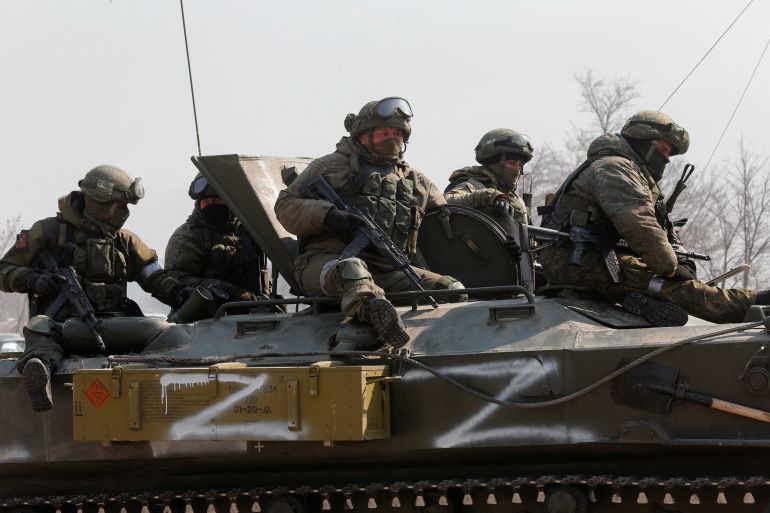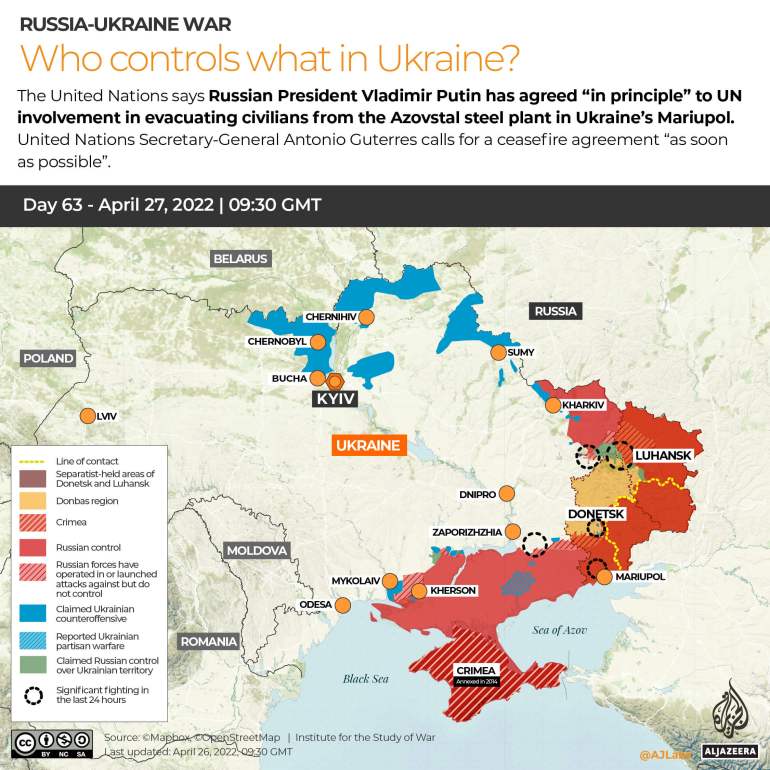Will Vladimir Putin succeed in seizing southwestern Ukraine?
After failing to capture the capital Kyiv and northern Ukraine, Russia now focuses on completing its conquest of the south.

Kyiv, Ukraine – It took several cruise missiles to destroy a bridge that linked southwestern Ukraine with Romania – and stood hundreds of kilometres away from the front lines of the Russian-Ukrainian war.
The missiles struck the bridge across the Black Sea estuary of the Dniester River near the town of Bilhorod-Dnistrovsky, some 450km (280 miles) southwest of Kyiv, on Monday.
Keep reading
list of 4 itemsPutin agrees ‘in principle’ to UN role in Mariupol evacuations
Chinese drone giant DJI suspends business in Russia, Ukraine
India struggles to find vessel to ship crude from Russia
Despite the region’s absence from recent headlines, its location could not be more strategic for the Kremlin’s new war cry.
After failing to seize Kyiv and northern Ukraine, Russia now focuses on expanding two separatist regions in southeastern Ukraine – and strives for a complete conquest of southern Ukraine, where Russian speakers are a prevalent majority that allegedly needs Moscow’s “protection”.
A top Russian general said on April 22 that Moscow wants its troops to reach Transnistria, a tiny breakaway province in Moldova that borders Ukraine’s southwestern Odesa region.
Its takeover will “ensure a land corridor to Crimea and also influence the crucial sites of Ukrainian military, the Black Sea ports through which Ukraine exports agriculture, metals to other countries”, Major General Rustam Minnekayev said.
Landing of paratroopers?
The steppe around the destroyed bridge is dotted with parts of ancient “limes” – or protective walls built by Roman emperor Trajan – as well as the ruins of fortifications installed by the Mongols, Ottoman Turks, and Nazi Germans.
The bridge’s bombing could herald the landing of Russian paratroopers in Transnistria, which lies to the north and has long been seen by Ukrainian officials and analysts as a potential springboard for a Russian invasion.
Moscow destroyed the bridge so it “could organise a paratrooper operation there”, Oleksiy Arestovych, an aide to Ukrainian President Volodymyr Zelenskyy, said in televised remarks on Monday.
A Ukrainian analyst called Moscow’s declaration an “unmasking factor” that disclosed Russia’s true tactical goals.

‘Detached language’
Apart from the creation of the “land bridge”, Moscow wants to isolate the rest of Ukraine from the Black Sea and mobilise potential pro-Russian collaborators, Kyiv-based analyst Aleksey Kushch said.
“But even this accentuation of goals didn’t work on a local population that realises its devotion to Kyiv,” he told Al Jazeera.
Southern Ukraine is multiethnic – there are Jewish, Greek, Bulgarian, Gagauz and Romanian diasporas who prefer to speak Russian.
But their linguistic choice does not translate into sympathies for Russian President Vladimir Putin, observers say.
“The language is detached from Moscow and does not belong to the Kremlin,” said Ivar Dale, senior policy adviser with the Norwegian Helsinki Committee, a rights watchdog.
“Indeed, most of the criticism against Vladimir Putin is voiced and written in the Russian language,” Dale, who lived in Ukraine and other former Soviet republics and speaks fluent Russian, told Al Jazeera.
A military analyst in Ukraine said even if the Russian landing in Transnistria does take place, it will not signify a change of the Kremlin’s military fortunes.
“They will not succeed in anything. They will have to put up with a defeat,” Anatoliy Lopata, former head of Ukraine’s General Staff of the Armed Forces, who currently serves as an adviser to Zelenskyy, told Al Jazeera.
He said Russia is running out of servicemen, military equipment, and ammunition – while Ukraine keeps receiving military, financial and diplomatic support from the West.
Mykolaiv and Odesa
In early March, the Kremlin claimed “complete” control over its largest trophy so far – the city of Kherson, capital of an eponymous southern region that borders annexed Crimea and once provided the arid peninsula with most of its water.
But Moscow’s offensive in Mykolaiv and Odesa, two southwestern regions that lie on the way to Transnistria, have been far less successful – if not outright ridiculous.
Moscow landed troops in the town of Chornobaivka – whose bottleneck location west of Kherson makes it the only way to advance towards Mykolaiv – 17 times.
But each time, Ukrainian drones and cruise missiles wiped out the landing parties that became the brunt of jokes and memes.
Russian forces launched dozens of missiles on Mykolaiv – a major shipbuilding centre – but have failed to storm its administrative capital.
Earlier this week, they suffered heavy losses between Mykolaiv and Kherson and retreated from five towns.
Russian warships blocked the coast off Odesa, but attempts to land paratroopers there without the support from ground forces have been a fiasco.
‘Blocked like an appendicitis’
And the arrival of sophisticated Western missiles endangers Russian military installations in Crimea.
“If the Odesa region is not occupied, [Ukrainians] will cover the entire areas of the Black and Azov seas with new missiles,” Igor Strelkov, a former “defence minister” in separatist Donetsk, told the News.ru publication on April 22.
“It is impossible to safeguard Crimea without liberating Odesa,” he was quoted as saying.
Russian military pundits admit the difficulty of seizing the increasingly fortified region and compared it to a surgery.
“Odesa is blocked like an appendicitis, but I think we will get to it in its turn,” retired Russian General Vladimir Shamanov told the Argumenty i Fakty newspaper on April 20.
The city of Odesa looks like an especially coveted war trophy. It used to be czarist Russia’s largest seaport and a major culture hub comparable to New Orleans in the United States or Beirut in Lebanon.
The city gave birth to generations of musicians, writers and satirists well known in the former Soviet Union. And many there ridicule Putin’s plans with a very endemic sense of humour.
“He will get tired of swallowing his own tears and snot,” a Ukrainian serviceman told Al Jazeera.